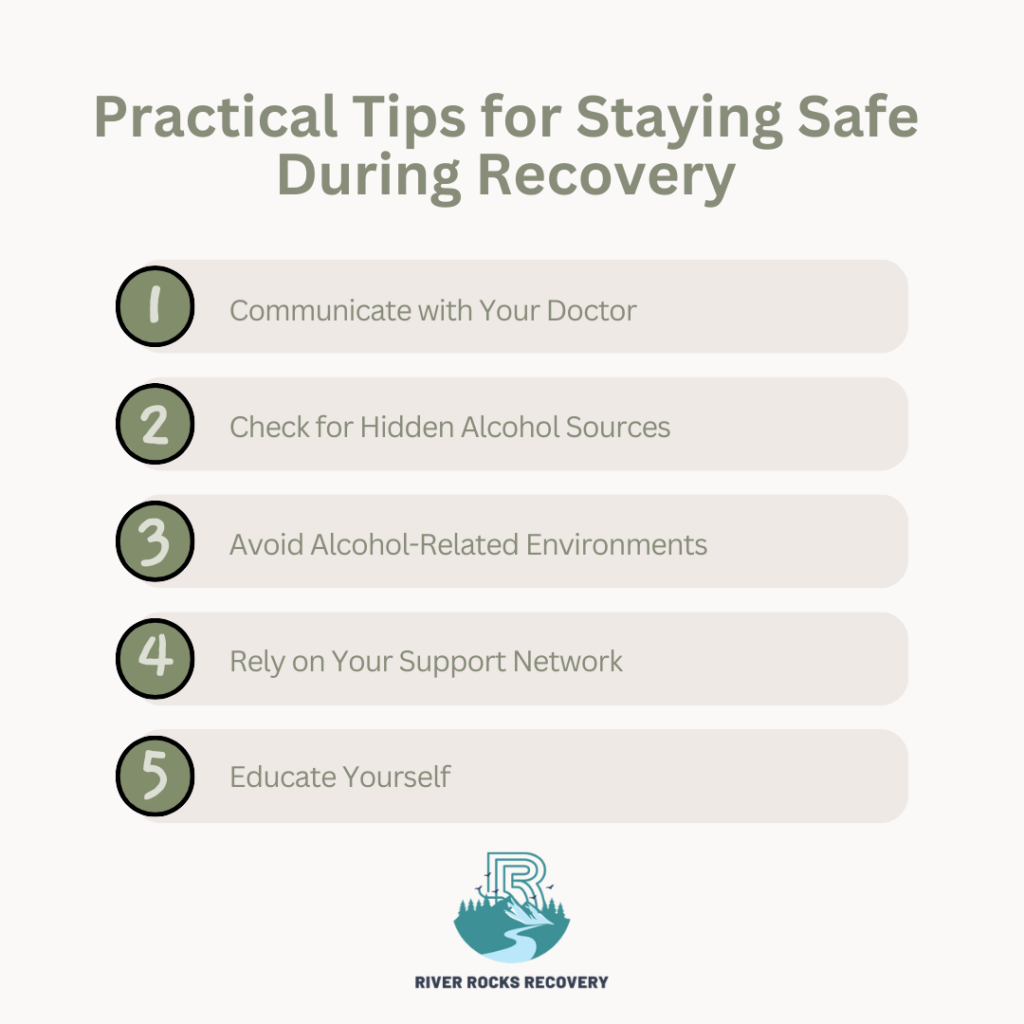Flagyl, also known by its generic name metronidazole, is an antibiotic used to treat a variety of bacterial infections, including those affecting the stomach, liver, skin, joints, and respiratory tract. However, when prescribed Flagyl, one of the most common warnings doctors give is to avoid alcohol during the treatment.
For those in recovery or anyone undergoing treatment, the relationship between Flagyl and alcohol is crucial to understand. The interaction between these two substances is more than just a general health recommendation—it can result in serious and potentially dangerous reactions. Let’s dive deeper into the risks and why this combination should be avoided.
What is Flagyl?
Flagyl is widely used to combat bacterial infections, particularly in the gastrointestinal system. It works by stopping the growth of bacteria, making it an effective treatment for conditions such as diverticulitis, pelvic inflammatory disease, and bacterial vaginosis.
Since Flagyl is such a powerful antibiotic, it comes with its own set of precautions. One major concern when taking Flagyl is alcohol consumption. Many people are curious if it is safe to drink while on this medication, but the simple answer is no—it is not safe.
Why Mixing Flagyl and Alcohol Is Dangerous
Combining Flagyl with alcohol is strongly discouraged due to the risk of a disulfiram-like reaction. Disulfiram is a medication used in the treatment of alcohol use disorder because it induces unpleasant reactions when alcohol is consumed, creating a strong deterrent. Flagyl can cause similar effects, leading to severe physical discomfort and potential danger.
Common Symptoms of a Disulfiram-Like Reaction Include:
- Nausea and vomiting
- Severe headaches
- Facial flushing (redness)
- Rapid heartbeat (tachycardia)
- Shortness of breath
- Dizziness and confusion
- Abdominal cramps or pain
These symptoms can appear within minutes of consuming alcohol while on Flagyl, and they can last for several hours, depending on the dosage of Flagyl and the amount of alcohol consumed. While these reactions are generally not life-threatening, they can be very distressing and pose risks, particularly for those with underlying health conditions.
How Long Should You Avoid Alcohol After Taking Flagyl?
The general medical recommendation is to avoid alcohol during your course of Flagyl treatment and for at least 48 to 72 hours after your last dose. This period ensures that the drug is sufficiently cleared from your body, significantly reducing the risk of any adverse reactions.
It’s important to note that even small amounts of alcohol, such as those found in some mouthwashes, cough syrups, or foods that may contain alcohol, can trigger the disulfiram-like reaction. For this reason, those taking Flagyl should be extra cautious about all potential sources of alcohol.
Alcohol and Recovery: A Dangerous Combination
For individuals in recovery, the risk of combining Flagyl with alcohol can have far-reaching consequences beyond the immediate physical reaction. In a recovery setting, such as an Addiction Treatment Center Ohio, the focus is on building new, healthier habits and learning to avoid the triggers that might lead to relapse. Accidentally consuming alcohol or being exposed to it while on a medication like Flagyl can be dangerous, not just physically, but also in terms of staying on the path of sobriety.
For patients who are participating in recovery programs, such as a Partial Hospitalization Program (PHP), Intensive Outpatient Program (IOP), or Outpatient Treatment Programs, maintaining a substance-free lifestyle is paramount to achieving long-term recovery goals. Mixing alcohol with Flagyl or any other medication may result in setbacks or relapse, disrupting progress and potentially leading to further treatment complications.
How Alcohol Can Impact Flagyl Treatment
The negative interaction between Flagyl and alcohol not only causes immediate physical reactions but can also undermine the effectiveness of the antibiotic and the recovery process. Here’s how alcohol can impact your treatment:
- Increased Side Effects: Drinking alcohol while on Flagyl can intensify side effects like nausea, vomiting, headaches, and dizziness, making it harder to complete the prescribed course of antibiotics.
- Risk of Treatment Failure: Alcohol can interfere with your body’s ability to properly metabolize medications, potentially reducing Flagyl’s effectiveness in treating the infection.
- Dehydration and Electrolyte Imbalance: Alcohol acts as a diuretic, causing dehydration and potentially disrupting your electrolyte balance, which can further complicate your recovery from both infection and addiction.
- Impact on Recovery: For those in recovery, consuming alcohol—even unintentionally—can set off cravings, destabilize emotional balance, and pose a risk of relapse.
By avoiding alcohol while taking Flagyl, you not only reduce the risk of adverse reactions but also help support your recovery journey and ensure the best possible outcome for your health.
Practical Tips for Staying Safe During Recovery
If you’re undergoing treatment with Flagyl and are in recovery from alcohol addiction, here are some important steps to keep in mind:
- Communicate with Your Doctor: Let your healthcare provider know if you are in recovery or have a history of alcohol use disorder. They can provide tailored guidance and help you avoid medications that may pose risks to your sobriety.
- Check for Hidden Alcohol Sources: Be vigilant about reading labels on over-the-counter medications, mouthwashes, and even food products to ensure they don’t contain alcohol.
- Avoid Alcohol-Related Environments: To minimize temptation and the risk of accidental exposure to alcohol, avoid social situations or environments where alcohol is present.
- Rely on Your Support Network: Talk to your therapist, counselor, or support group about your medication and the need to avoid alcohol. Staying connected can help you remain accountable.
- Educate Yourself: Knowledge is power. Stay informed about any medications you are prescribed and their interactions with alcohol or other substances.

Struggling with Alcohol? You’re Not Alone
For some individuals, it can be challenging to stop drinking, even when advised by a healthcare provider. If you’re finding it difficult to avoid alcohol during your Flagyl treatment, it may be a sign of a larger issue related to alcohol dependency. Seeking help from a professional treatment center can make a world of difference in managing and overcoming addiction.
At an Addiction Treatment Center Ohio, you can find various programs to support your journey to recovery. Whether you need intensive therapy or a more flexible approach, Ohio offers comprehensive Addiction Treatment Programs that cater to your specific needs.
1. Partial Hospitalization Program (PHP)
A Partial Hospitalization Program is ideal for individuals who need structured treatment but don’t require 24-hour care. It provides intensive therapy during the day while allowing patients to return home in the evening. This balance between professional care and personal freedom can be beneficial for those recovering from alcohol addiction.
2. Intensive Outpatient Program (IOP)
An Intensive Outpatient Program allows patients to maintain their daily responsibilities, such as work or school, while receiving treatment. IOPs offer therapy sessions several times a week, focusing on helping individuals develop healthy coping mechanisms and addressing the root causes of addiction.
3. Outpatient Treatment Programs
For individuals with mild to moderate alcohol dependency, Outpatient Treatment Programs can provide the flexibility needed to continue with everyday life while seeking help. These programs include individual therapy, group sessions, and educational resources to support long-term recovery.
Benefits of Seeking Help
Taking the step to seek professional help from an Ohio Addiction Treatment Center can make a tremendous difference in your recovery journey. Here are some of the key benefits:
- Supportive Environment: Being in an environment with others who understand what you’re going through can help reduce feelings of isolation.
- Personalized Treatment Plans: Programs like Addiction Therapy Programs focus on creating tailored treatment strategies that address the specific needs of each patient.
- Long-Term Recovery: With proper treatment, individuals can achieve long-lasting sobriety and improve their quality of life.
Final Thoughts
While Flagyl is highly effective in treating bacterial infections, it is crucial to avoid consuming alcohol during treatment. The risks associated with mixing the two are simply too high, and the potential side effects can range from unpleasant to life-threatening.
Struggling with alcohol dependency? Ohio Addiction Treatment Center offers life-changing solutions with specialized programs like Addiction Therapy, Partial Hospitalization, and Outpatient Treatment. Take the first step towards a healthier, alcohol-free life. Remember, your health should always come first. Avoid the risks, seek help if necessary, and follow the advice of your healthcare provider as much as possible. Embrace the comprehensive care offered at River Rocks Recovery, and contact us today at (888) 905-6281.
FAQs on Flagyl and Alcohol
Is it safe to drink alcohol while taking Flagyl?
No, it is not safe to drink alcohol while taking Flagyl. Doing so can cause a disulfiram-like reaction, which can lead to severe nausea, vomiting, headaches, and other unpleasant symptoms.
How long should I wait to drink alcohol after finishing Flagyl?
You should wait at least 48 to 72 hours after your last dose of Flagyl before consuming alcohol to ensure the medication has fully cleared from your system.
What happens if I drink alcohol while taking Flagyl?
If you drink alcohol while on Flagyl, you may experience a disulfiram-like reaction, which includes symptoms such as severe nausea, vomiting, headaches, flushing, and rapid heartbeat.
Can I use products with alcohol, like mouthwash, while taking Flagyl?
Even small amounts of alcohol in products like mouthwash or certain medications can trigger a reaction, so it’s important to avoid any alcohol-containing products while taking Flagyl.
How can I avoid alcohol while on Flagyl if I’m in recovery?
Be proactive by checking all labels for hidden alcohol content, avoiding social settings where alcohol is present, and staying in close communication with addiction treatment center.




























